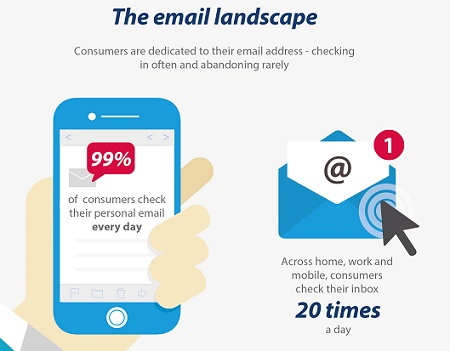How do consumers’ treat their email accounts and what can brands do to become trusted mainstays of their inbox? The latest edition of the Consumer email tracker 2017 report from the DMA highlights how 99% of consumers check their personal email every day, checking their inboxes around 20 times a day.
The research also found that consumers rarely abandon an email address, with 83% still using their ‘first ever’ email address as their main account and 59% saying they have never deactivated an email address. However, some behaviour is changing as consumers name have 2-3 email accounts each, on average, and 44% have a specific email address set-up to receive marketing messages.
Skip Fidura, Client Services Director at dotmailer and Chair of the DMA’s Responsible Marketing Committee, understands the complexity of the current market for email marketers but also glimpses the potential for an improved, and more transparent consumer-marketer relationship: “We have been talking about being open, honest and transparent with the people on our list as best practice for years. Clearly defining what data you’re collecting, how you plan to use it, how you will store it and how long you are going to keep it is no longer best practice, it is the law.”
In all, consumers believe they are signed-up to an average of 14 mailing lists on their personal accounts, using their work accounts to sign-up for just 2. Consumers also believe more than half of the emails in their inbox are marketing messages and despite the stability of the average inbox some consumers can be pushed to unsubscribe or even abandon an email address.
For example, over half (53%) of consumers feel they receive too many irrelevant emails from brands and 1 in 5 people say they’ve abandoned an email address due to receiving too many emails. To convince them brands are handling their data responsibly, consumers most commonly cite access to a preference centre (37%) and clear privacy policies (37%) as the drivers of trust.
Consumers are also more likely to read concise emails. Rachel Aldighieri, MD at the DMA, says brands need to focus on crafting each email carefully, without resorting to gimmicks: “Engagement is driven by relevant, short and actionable emails. Our hero principle at the DMA is to put the customer first and we can do this by applying these research findings in a practical way. We know, for instance, consumers are engaging well with simple emails composed of well-written text and images. The power of the craft of copywriting should not be underestimated.”
Against a background of rapid technological change, the email address remains the primary gateway to online – and an indispensable touchpoint between marketers and their audience. These findings highlight the need for transparency and – once they’ve signed up – sending relevant communications. Build trust with access to preference centres and clear privacy policies. By combining these approaches, brands can make the most of the stable touchpoint email offers, and avoid betraying your customers’ trust and expectations.
To find out more about the research visit: https://dma.org.uk/research/consumer-email-tracker-2017
